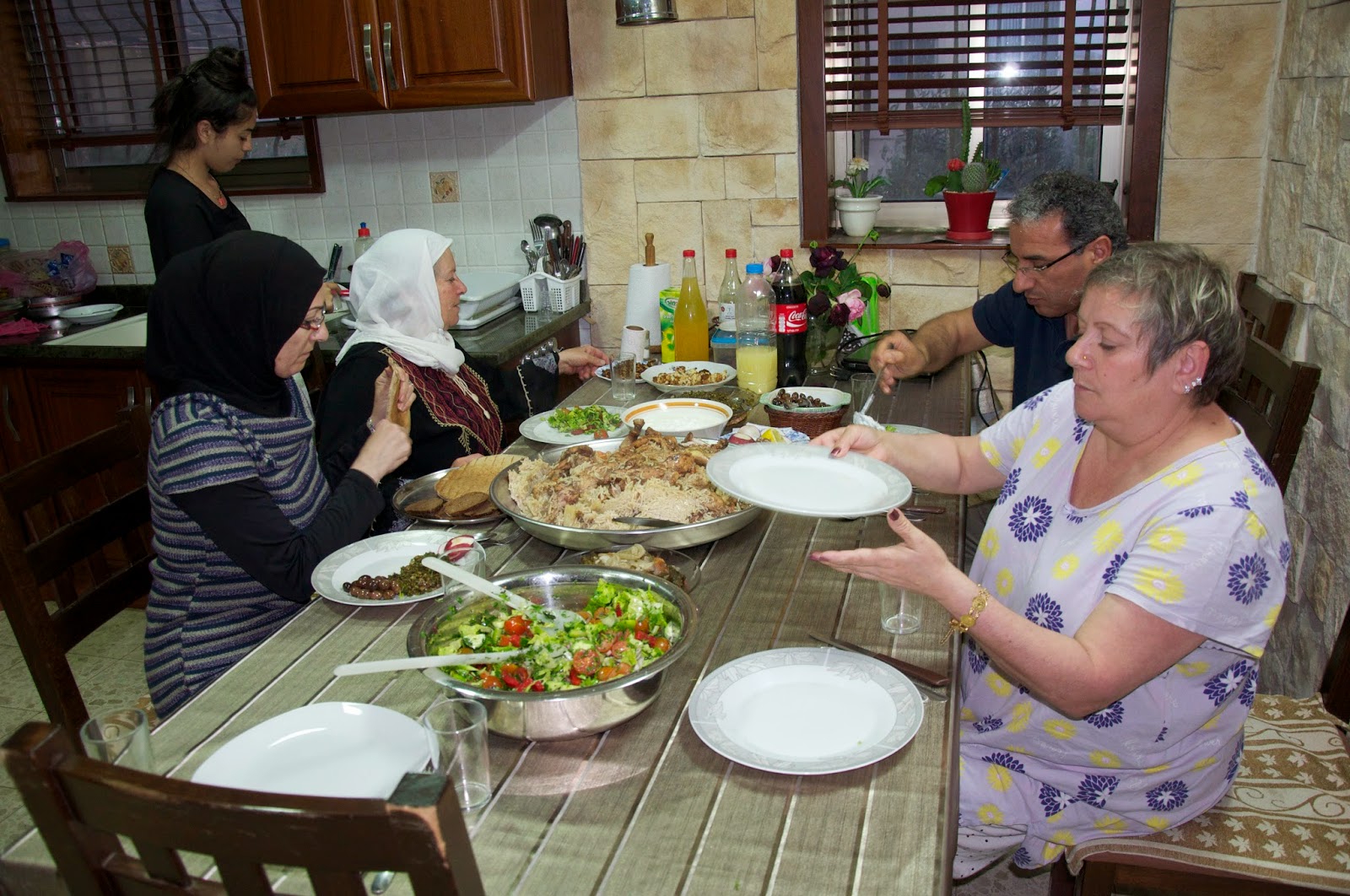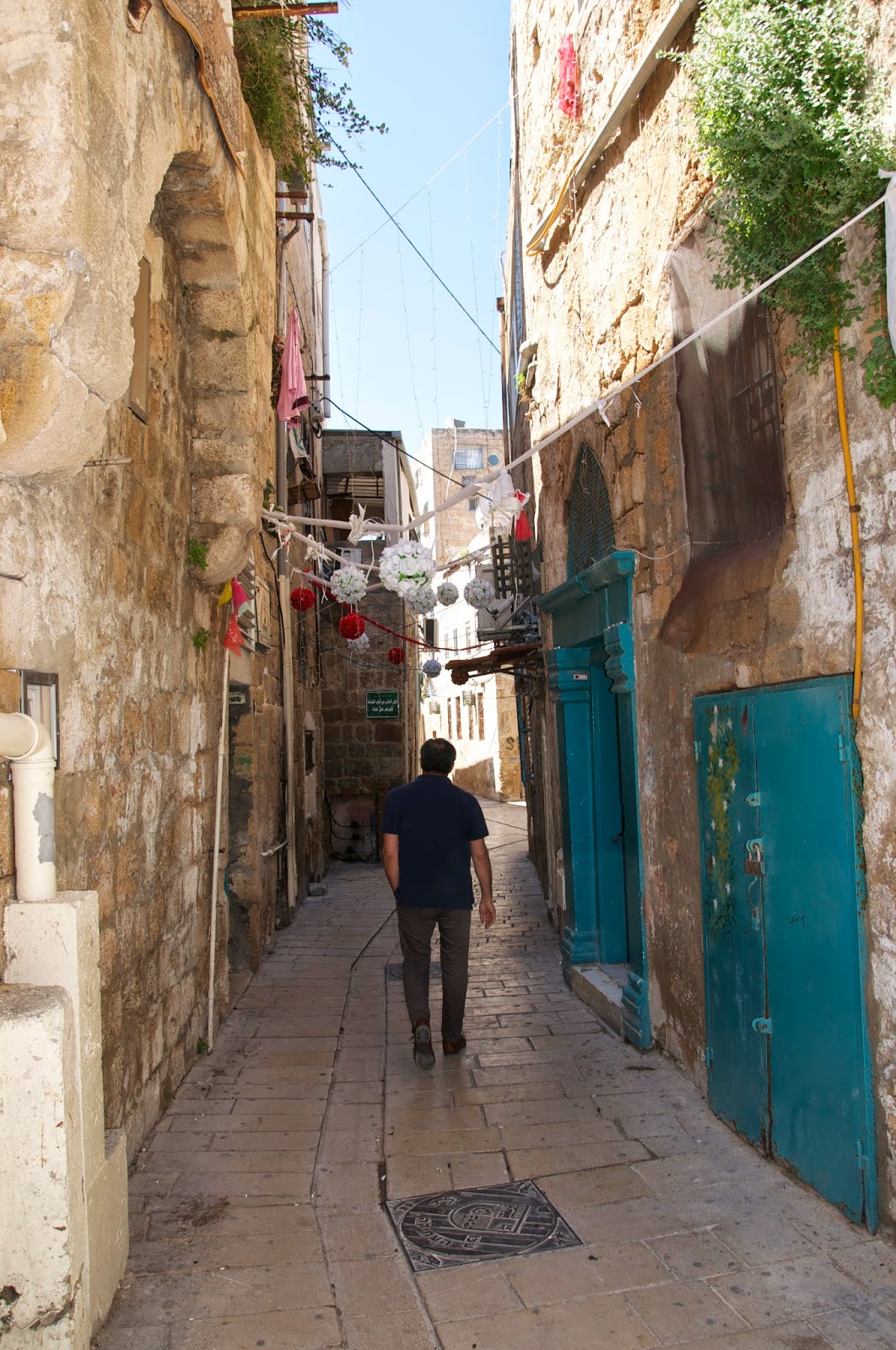I'm back in Adahya, where Khitam and Ahmad live, after two days and nights in and around Acre where her five sisters and four out of her five brothers live. Which reminds me to correct an earlier blog: three of Khitam's sisters are widows, not all five of them and all five are hajis. women who've been to Mecca. This will be my last blog from Palestine. It's Saturday evening and I leave early Monday morning. I hope to write one more, reflecting on my two and a half weeks here, after I return to Maine.
 |
| Zada, Khitam and Ahmad |
Wednesday and Thursday nights we spent with Zada, the youngest of Khitam's five older sisters. She is closest to Zada, who was a second mother after their mother died when Khitam was seventeen. Zada is the toughest of the sisters and the most outgoing. I told Khitam Zada was very welcoming and strong and that I doubted I would want to get on her bad side. "Oh no, you don't want to get Zada angry at you!" she said.
 |
| Nisreen, Zada, Ahmad and Khitam and a "light supper" |
We arrived around 5:30, Wednesday, after our delicious and very filling "lunch" at Naseba's. I assumed we wouldn't eat again - silly me! Within an hour, the house was packed with family. Inas arrived; he is one of Zada's sons, married to Hinadi and they have five children. They have a house near his Zada's but live during the week in Haifa because he and Hinadi both work there. Nasri and his wife Zuzu were also there with their two young daughters; he is Inas' brother and he and his family live between Zada and Inas. Zada's other son lives upstairs with his family. Zada's daughter Nisreen was also there and a few others I don't know. Everyone ate: there's was a mezza with plenty of food for everyone. Family lingered and talked, watched TV, let the children run the show until they were worn out and in someone's lap.
 |
| Eleventh century Acre |
Villages like Naher, where Zada and most of her family live, seem randomly assembled with neither rhyme nor reason; however, there is reason and it's based on the family. Often, villages had large plots of land owned by a family, maybe the grandfather of those who live there now. After a son found work and married, he would likely build a house for his own family on his father's land. The same would happen with the next son and the next if there were more. Daughters would move to a house their husband would build on his family's land. And so the traditional village grew, not from a town plan but from family plans. As a result, village and town roads are often challenging for cars going in opposite directions and horns are essential before rounding the corner of a building that abuts the street.
 |
| Khitam's brother, Wahib, who, when he was a boy... |
Thursday, Khitam, Ahmad and I headed for the Golan, that area that sticks into Syria like a peninsula and was once Syrian and Palestinian but has been occupied by Israel since the 1967 war. It's a beautiful drive. The countryside is dotted with Palestinian villages and olive grooves. There are several Palestinian villages where Muslims, Christians and Druze mix easily. We hiked for an hour and a half in the Tel Dan Nature Reserve in the Golan, a natural park maintained by Israel's Parks Authority. It is lovely, with the Dan River rushing full of melted snow from Mt. Hermon. In this part of the world, water is very important, as it is becoming in more and more of the world. There were several groups of Palestinian students in the park with their teachers and leaders. These are Palestinian residents of Israel who comprise 20% of Israel's population.
 |
| …jumped off the wall, like this! |
When we got back to Naher, Zada was already hard at work on dinner. It was ready an hour and a half later: on a tray that was at least two and a half feet in diameter maklouba was piled, a delicious mix of rice, carrots, onions and chicken all cooked together. There was enough for a week unless you were at Zada's house. It would all be gone in a couple of days with sons and daughters and grandchildren and nephews and nieces coming by to eat. Zada also put on the table a large salad, roasted cauliflower, stuffed grape leaves, yoghurt, olives, bread and probably more I can't remember. As we ate and after, family members stopped by, had a little or a lot to eat, and moved outside or to the living room or porch to talk, the kids to play. Tonight there will be more family to sit down and eat; tomorrow there will be little maklouba left, if any.
 |
| Habib, Khitam, Ahmad and Minerva |
On our way home from Naher yesterday, we stopped in Rama, one of those mixed villages I just mentioned, to visit with Habib and Minerva Daoud, a Palestinian couple who have run a small restaurant there for twenty years. We had fresh lemonade, Arabic coffee and a light creamy pudding that Habib had made that morning. He is the cook in their restaurant, offering "traditional Palestinian cooking with a contemporary twist." He asked Ahmad about his work and Ahmad told him he had just found something in the Acre area but his real love is wine - he lived and worked in France for twenty-three years - and he'd like to find wine-related work. His goal is to be a sommelier. Habib called an Israeli wine-maker in the area, a friend of his, told him about Ahmad's interest and set up a meeting for the two of them. He also offered to host wine-tasting dinners at his restaurant. It's all who you know! We left without paying; Habib and Minerva wouldn't hear of it.












No comments:
Post a Comment